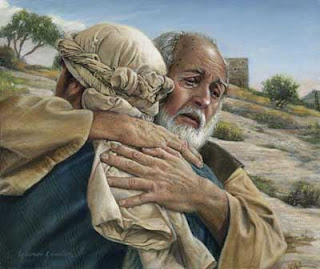Prodigal
DISCLAIMER: The following thoughts are from my not seminary trained mind and heart. If there is something within the content of this post that is downright unscriptural, I am counting on my friends who know better to set me straight.
Main Entry: 1prod·i·gal
Pronunciation: \ˈprä-di-gəl\
Function: adjective
Etymology: Latin prodigus, from prodigere to drive away, squander, from pro-, prod- forth + agere to drive — more at pro-, agent
Date: 15th century
1 : characterized by profuse or wasteful expenditure : lavish
Luke 15:11-32
11Jesus continued: “There was a man who had two sons. 12The younger one said to his father, ‘Father, give me my share of the estate.’ So he divided his property between them.
13″Not long after that, the younger son got together all he had, set off for a distant country and there squandered his wealth in wild living. 14After he had spent everything, there was a severe famine in that whole country, and he began to be in need. 15So he went and hired himself out to a citizen of that country, who sent him to his fields to feed pigs. 16He longed to fill his stomach with the pods that the pigs were eating, but no one gave him anything.
17″When he came to his senses, he said, ‘How many of my father’s hired men have food to spare, and here I am starving to death! 18I will set out and go back to my father and say to him: Father, I have sinned against heaven and against you. 19I am no longer worthy to be called your son; make me like one of your hired men.’ 20So he got up and went to his father.
“But while he was still a long way off, his father saw him and was filled with compassion for him; he ran to his son, threw his arms around him and kissed him.
21″The son said to him, ‘Father, I have sinned against heaven and against you. I am no longer worthy to be called your son.[b]’
22″But the father said to his servants, ‘Quick! Bring the best robe and put it on him. Put a ring on his finger and sandals on his feet. 23Bring the fattened calf and kill it. Let’s have a feast and celebrate. 24For this son of mine was dead and is alive again; he was lost and is found.’ So they began to celebrate.
25″Meanwhile, the older son was in the field. When he came near the house, he heard music and dancing. 26So he called one of the servants and asked him what was going on. 27’Your brother has come,’ he replied, ‘and your father has killed the fattened calf because he has him back safe and sound.’
28″The older brother became angry and refused to go in. So his father went out and pleaded with him. 29But he answered his father, ‘Look! All these years I’ve been slaving for you and never disobeyed your orders. Yet you never gave me even a young goat so I could celebrate with my friends. 30But when this son of yours who has squandered your property with prostitutes comes home, you kill the fattened calf for him!’
31″ ‘My son,’ the father said, ‘you are always with me, and everything I have is yours. 32But we had to celebrate and be glad, because this brother of yours was dead and is alive again; he was lost and is found.’ “
To my fellow brothers and sisters in Christ:
How many sermons, bible studies and personal studies have been devoted to this parable? Personally, I’ve lost count. And while I love the idea of Father God welcoming home his son who “was dead and is alive again”, it always left me with this feeling of an incomplete story. So often we devote so much discussion to the wayward son and the forgiving father. But it has been my experience that the older brother is mentioned merely as an afterthought. Even when the oldest is discussed at length, it is with the caveat that “at least he’s not THAT guy!” (referring to the younger brother).
This never sat well with me because at the end of the story, I always said to myself, “What about the older brother? That guy was a TOOL!” Perhaps it is because I naturally identify so much with the younger brother, but I think it is more than that. Check out how Luke Chapter 15 begins:
1Now the tax collectors and “sinners” were all gathering around to hear him. 2But the Pharisees and the teachers of the law muttered, “This man welcomes sinners and eats with them.”
Is it too far of a stretch for me to suggest that the main intended audience for this parable (and the rest of them for that matter) is the Pharisees and the teachers of the law? Notice that the father (God) is reconciled with the younger son (sinners). What Jesus does not tell us is whether or not the older brother ever got over himself and realized his sin. So bitter was his hatred towards his younger sibling that he would not even recognize him as his brother. I don’t know about you, but I find this more than just a little unsettling.
As I mentioned before, I identify with the younger son, but there have been times in my life that I have identified with the older brother. When I begin to feel righteous about my faith, I try to do a gut check to make sure that it is not self-righteousness, especially when I find myself making excuses for my lack of compassion and apathy. While we are saved by grace and not works, we will give an accounting to God as to how we lived our lives; how we loved one another.
My inspiration for the post was a book by Tim Keller called The Prodigal God. While I would highly recommend the book, what I really want to recommend is this:
If it’s been awhile since you’ve read the gospels of Matthew, Mark, Luke and John, put aside everything else you are reading for a bit. Read this amazing and life changing story of the Savior of the world with the wonder of a child. It is the most compelling love story ever written.
“In this story [of the lost sons] the father represents the Heavenly Father Jesus knew so well. St. Paul writes: ‘God was in Christ reconciling the world to himself, not reckoning to them their trespasses’ (2 Cor 5:19-American Standard Version). Jesus is showing us the God of Great Expenditure, who is nothing if not prodigal toward us, his children. God’s reckless grace is our greatest hope, a life-changing experience…” (Tim Keller, The Prodigal God)
May you feel renewed by the love of a Prodigal God, whose love for you is beyond measure.
P.S. – Nick the Geek wrote a great post along these same lines. Check it out here













